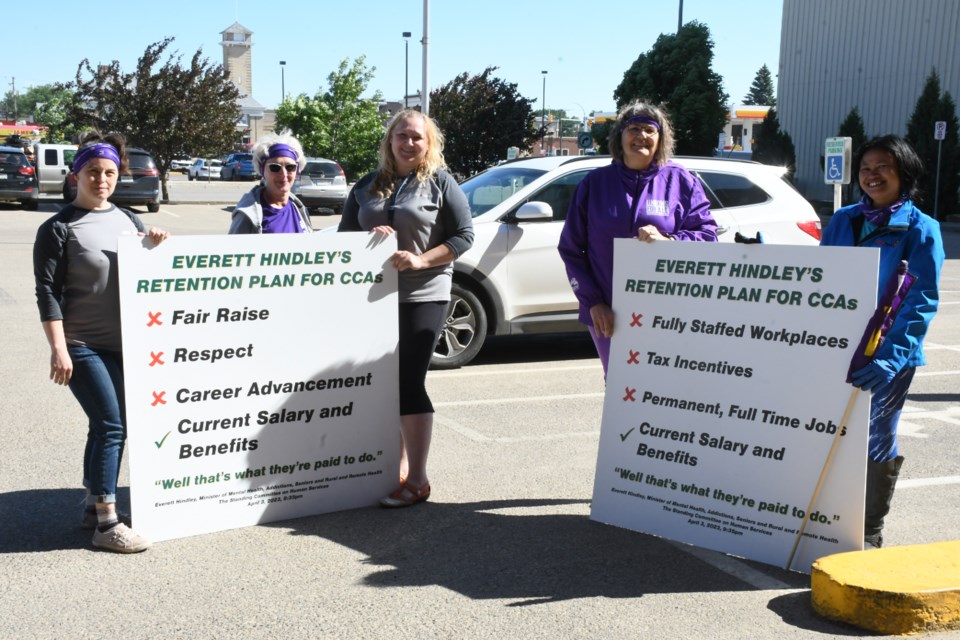A union representing thousands of Saskatchewan health-care workers picketed outside the Events Centre and handed out flyers to protest a government minister speaking at a chamber-sponsored breakfast.
Members and supporters of the Service Employees International Union West (SEIU-West) gathered outside on June 15 with two large banners in response to a presentation by MLA Everett Hindley, minister of health and addictions, seniors, and rural and remote health, who spoke during the event about mental health and addictions services.
The protesters’ goal was to highlight the government’s supposed lack of a focused plan to retain and invest in front-line health-care workers. Specifically, they were critical of Hindley’s “dismissive comments” about continuing care assistants and hiring more of them.
While speaking to the legislature’s standing committee on human services on April 3, the committee asked Hindley how he planned to retain CCAs. In response, he said they would receive salaries and benefits.
When asked to confirm whether the province’s retention strategy was solely salary focused, he replied, “Well, that’s what they’re paid to do.”
“Members of the public were shocked to find out the number of jobs that are temporary and part-time,” Barbara Cape, president of SEIU-West, said. “Residents, clients, patients, and their families have seen for themselves that staffing levels are too low for the quality of care required.”
The union provided numbers as of June 8 about health-care jobs advertised as temporary, casual, or part-time versus permanent and full-time.
The first group has 201 licensed practical nurse (LPN) positions, 186 CCA positions and 38 medical radiation technologist (MRT) spots. In the second group, there are 20 LPNs positions, 16 CCA spots and two MRT positions, which means only 24 per cent of health-care postings are permanent and full-time.
During a media scrum, Hindley said several health-related unions would be entering into contract negotiations soon with the province, which is important for staff.
However, he pointed out that hiring more employees is also important because Saskatchewan’s population is growing. This is great for the economy but puts pressure on areas such as health care, education and social services.
“One of the most consistent messages that I’ve heard from front-line health-care providers … when I visit long-term care facilities and hospitals across this province is we need more staff,” Hindley said.
The province is working to create more permanent full-time positions because people are declining to apply for part-time, temporary spots, he continued.
The government is also working on training more people and expanding training seat capacity, which it has done by adding 550 spaces and will continue to do, Hindley added. This will ensure it can capture university graduates while also bringing in more international workers.
Retention of health-care providers has been an ongoing challenge, while Hindley’s comments about the government’s retention plan and wages indicate a lack of understanding of the work CCAs and other health-care providers do daily, Cape said.
SEIU-West indicated that CCAs — who bore the weight of the pandemic while helping others — perform most of the hands-on heaving lifting in long-term care homes, retirement homes, hospitals and home centres.
“The comments made by Minister Hindley are dismissive, disrespectful and show a shocking lack of understanding of what is needed in the health-care system,” said Cape. “They undermine the very severity of the situation we find ourselves in and speak to the lack of meaningful consultation with our members.
“Our members do their job every day. We’d like a rural and remote health minister (who) will do the same and actually listen to what our members have been saying for years — a fair raise and good working conditions.”




